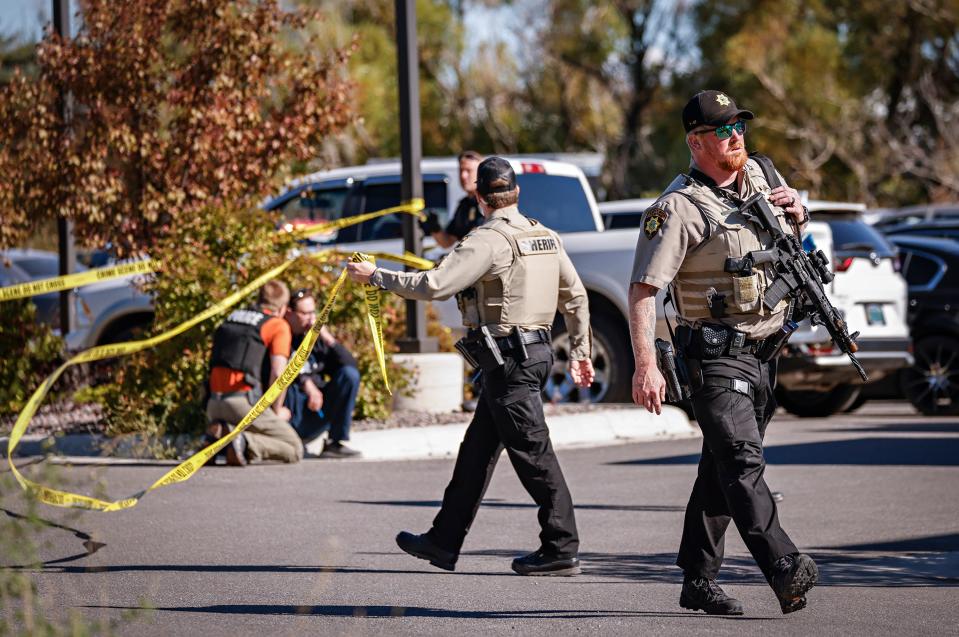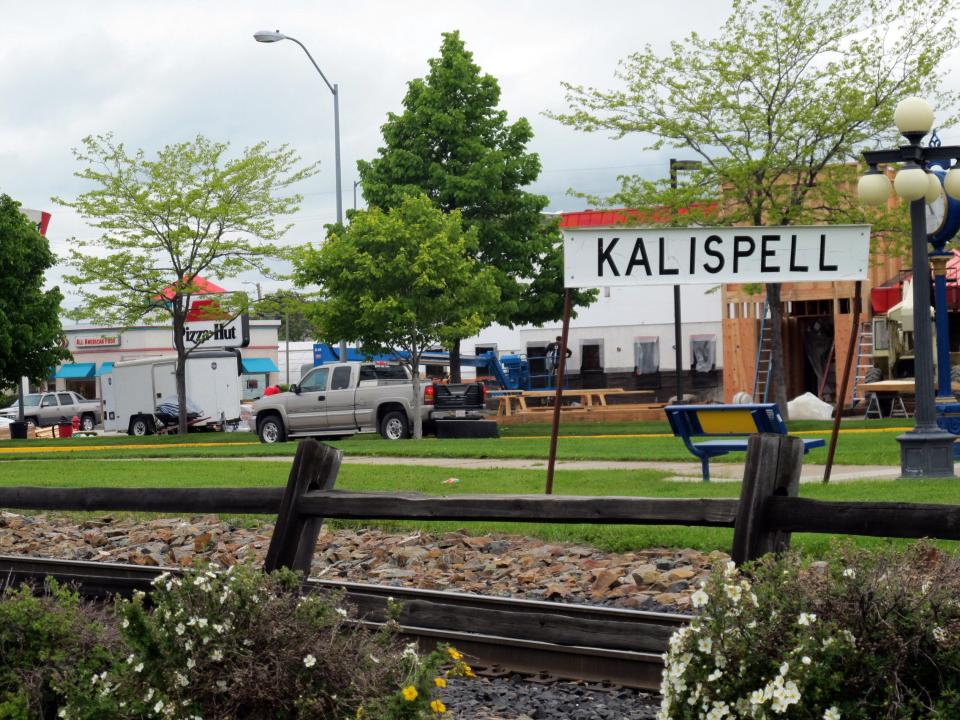After homeless man beaten to death in Montana town, advocates say they saw it coming
Scott Bryan had less than $65 to his name the night police said he was beaten to death by a 19-year-old man outside of a gas station in Kalispell, Montana.
Bryan, 60, had lived on-and-off the streets since 2021, in the community of 28,000 residents about 200 miles southeast of Helena. But friends were getting worried about Bryan – he was trying to make $65 last for weeks while dealing with health problems and the increasingly hostile attitude some in the community had started to take toward him and others struggling to survive.
On June 25, around 2 a.m., police said Kaleb Fleck, 19, and an 18-year-old friend were sitting inside a pickup truck when Bryan approached them. Moments later, Bryan was lying on the ground with severe facial trauma, including exposed bone and a nasal cavity that appeared crushed, according to police. Fleck was arrested and charged with killing Bryan.
It may be a more violent version of the encounter that played out on a New York City subway nearly two months earlier, where U.S. Marine veteran Daniel Penny choked Jordan Neely, killing him. That case drew national attention, including acclaim for Penny from right-wing pundits, but experts say both Nelly and Bryan's cases point to the violence homeless Americans regularly encounter.
“This everyday violence is, in part, spurred by false narratives that stoke fear and frame people who are homeless as aggressors,” said Margot Kushel, a researcher on homelessness at the University of California San Francisco. “We must reject those narratives and recognize that, instead, they are our friends, family, and neighbors who have been left behind by the housing shortage, lack of funding for rental assistance for low-income renters, and the ongoing effects of structural racism,”
Bryan's 'biggest strength and biggest weakness was his kindness'
Bryan’s journey to the streets of northwest Montana began like it does for many Americans, with a health crisis and financial hardship.
The Connecticut native was diagnosed with epilepsy and was a lung cancer survivor in his 20s, said Bryan’s sister, Holly Torska, and he lived for a while with his parents while holding down part-time jobs.
“They determined he could not ever work long enough to earn a livable wage due to the disease. Though this was his fate, he continued to apply over and over again landing jobs here and there only to have his health issues end them for him," Torska said. "Scott wanted to be a productive member of society, but that was not the hand he was given."
Family originally helped draw Bryan to Montana, but within about 18 months he had landed in Kalispell – first staying in a warming center and more recently in low-income housing, said Sean O’Neill, community services department director for the Community Action Partnership of Northwest Montana.
“He was one of those guys who was kind of a grouch but once you got to know him, you could actually see that he cared a lot about people. Which is kind of funny because he had his own stuff he was still working through. His strength and his weakness was his kindness,” O’Neill said.
After being housed for almost two years, Bryan lost his housing in April because he was letting people stay over. Most of the people he invited over were women, who he felt he could give a safe space to, O’Neill said.
The day before Bryan died, O’Neill said they joked that Bryan had to be ready to fight if something happened. O’Neill said he had intended to keep the conversation light-hearted, but also wanted Bryan to be alert, because he was getting harassed regularly and was attacked a couple weeks before his death.
“The saddest part about this is we have to come at this as a community to say we need to protect our homeless folks because they're vulnerable. He was the epitome of that vulnerability,” O’Neill said.
“He was scared towards these last few weeks.”
Fleck’s attorney did not respond to requests for comment.
Fleck pleaded not guilty to deliberate homicide and was released from custody July 6 after a man 'with deep ties to Flathead Valley' joined a group that agreed to act as surety to help cover Fleck’s $500,000 bail, the Daily Inter Lake reported.
A crisis on the streets
As in many communities, a mental-health crisis has been playing out on Kalispell’s streets, said Tonya Horn, executive director of the Flathead Warming Center. And in a small community with limited resources, Horn said it’s easy for residents to see others in need and think “we don’t have the help they need.”

Another violent incident in September 2021 caused some residents to harden their stances on the issue.
Police said a man who was living on the grounds of a Kalispell business got into a dispute with one of its employees, killing the employee.
Afterward, Flathead County Commissioners started receiving letters and comments from the public who voiced their concerns about “aggressive homeless, safety in the city parks and unsanitary debris,” said Kim Grieser, county public information officer.
And when Kalispell closed a park earlier this year because of homeless camping, county commissioners wrote an editorial that encouraged residents to “stop enabling” the homeless community, Horn said.
“Their letter did not call for violence, but their letter gave a platform for people who have felt that way. Their letter also gave that platform for people to hate,” Horn said. “Our community leaders might be struggling with trying to solve the homeless problem in our county, but it’s a problem that is prevalent all across the United States.”
'There can't be another Scott Bryan here'
There are more than 580,000 Americans experiencing homelessness and violence can be a constant threat, Kushel said.
The homeless population in the U.S. experiences acts of violence at a rate two-to-10 times that of the general public, according to a 2014 report that explored the connections between violence and homelessness.
And a more recent survey from the National Coalition for the Homeless, published in 2018, included a 16-year review of data that showed 476 homeless people killed in acts of violence, with suspects generally male and under the age of 30; more than 35% of those cases were classified as hate crimes.
Research has shown that violence perpetrated on homeless individuals can have serious consequences. It has the potential to cause physical and psychological injuries, extend homelessness, and may require considerable medical treatment that most homeless individuals are unable to afford. Violence also contributes to lower levels of perceived safety and an exacerbation of preexisting mental health issues, the study stated.
And in many communities around the country, residents see others struggling and are convinced that people have moved there to be homeless, Kushel said, though there's little data to support that.
“What we’re seeing is the tamping up in what I might call victim-blaming rhetoric,” she said. “There has been an increase in people taking out their frustration with the current policy environment, which has gotten us into the situation, and taking it out on the people who in some ways are suffering the most from policies.”

In Kalispell, Horn is working with the mayor to put together a homeless council, which will include homeless residents, to come up with solutions for problems in the community.
The shelter Horn runs provides 50 beds at night, showers and laundry services in addition to bringing in groups from other community organizations to provide job information or mental health services to those who stay over.
You might not drive into town and see tent cities, Horn said, but you're also not going to see compassion from community leaders.
“We're trying so desperately hard to come up with solutions,” Horn said.
The attack on Bryan was not a surprise to advocates, considering how much hostility and frequent harassment the homeless population had experienced since the beginning of the year. They've spent recent years warning this type of violent encounter might happen in Kalispell – and trying to change the narrative around homelessness in the area in order to prevent it, O’Neill said.
“He [Bryan] was the person we were most worried about in our community and that worst thing that could have occurred did occur,” O’Neill said. “Now, we just want to make sure that it never happens again because there can't be another Scott Bryan here. We know we can't stop it everywhere.”
This article originally appeared on USA TODAY: Scott Bryan's Montana beating death puts homeless, hostility in focus
